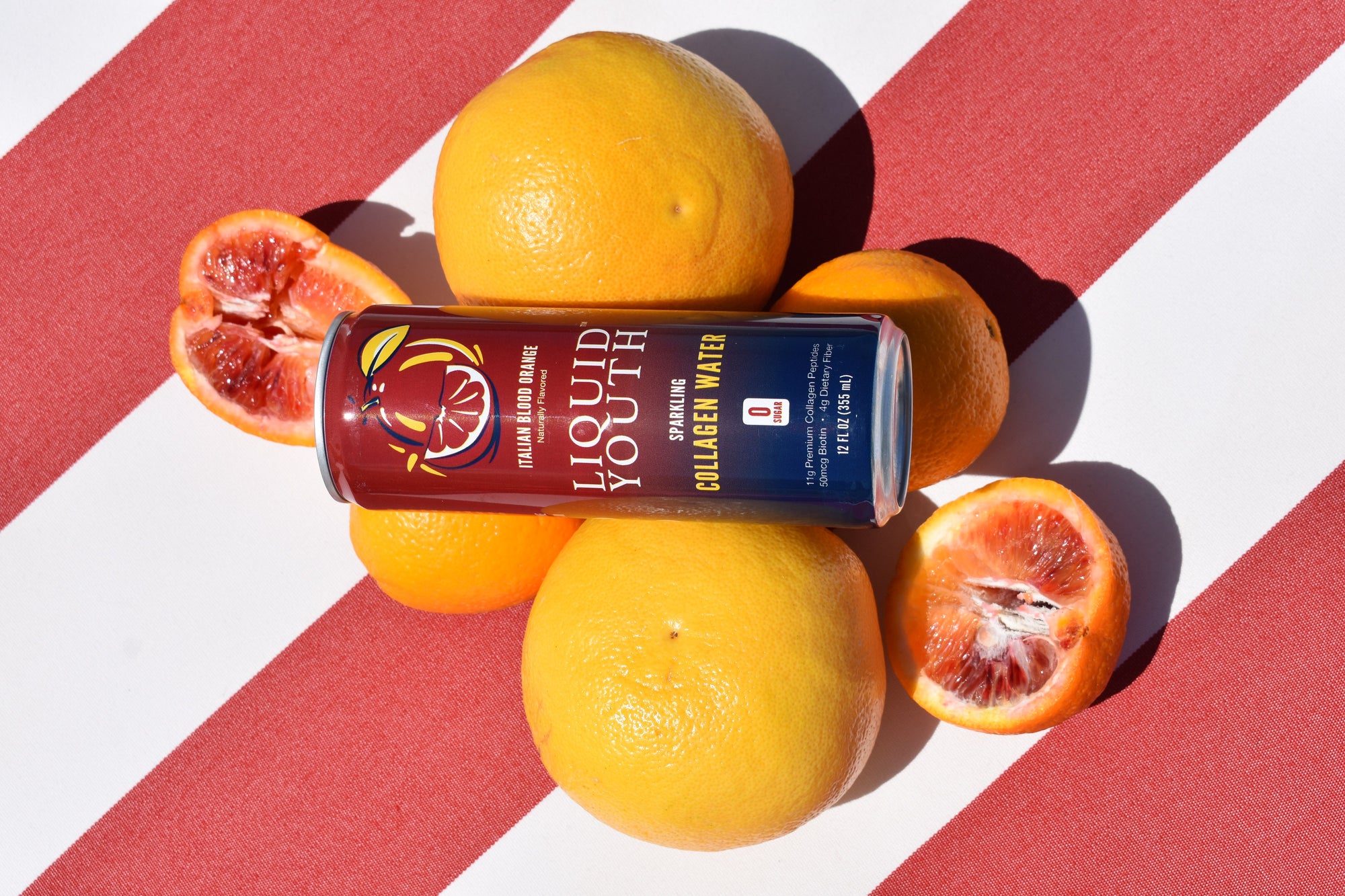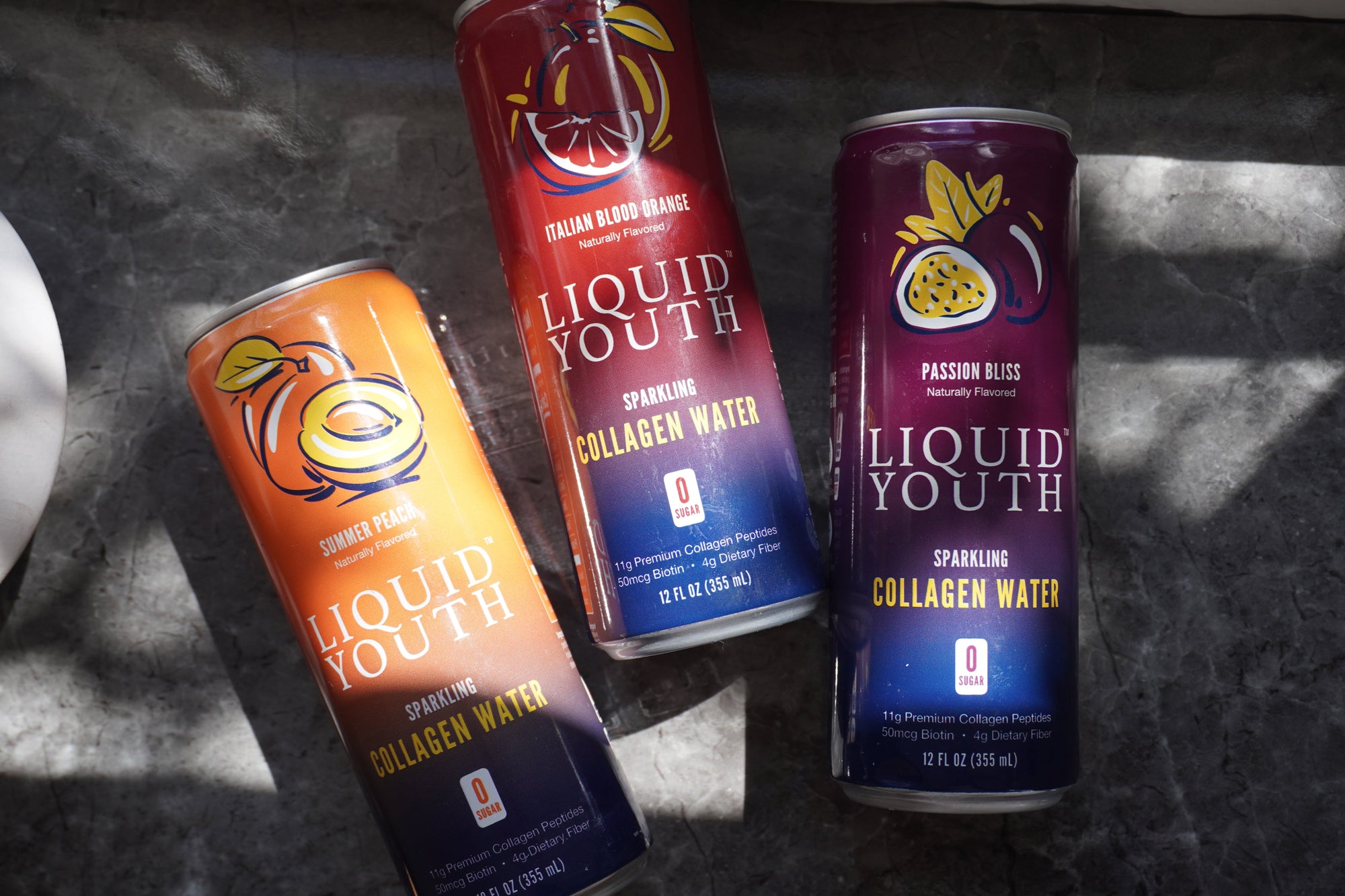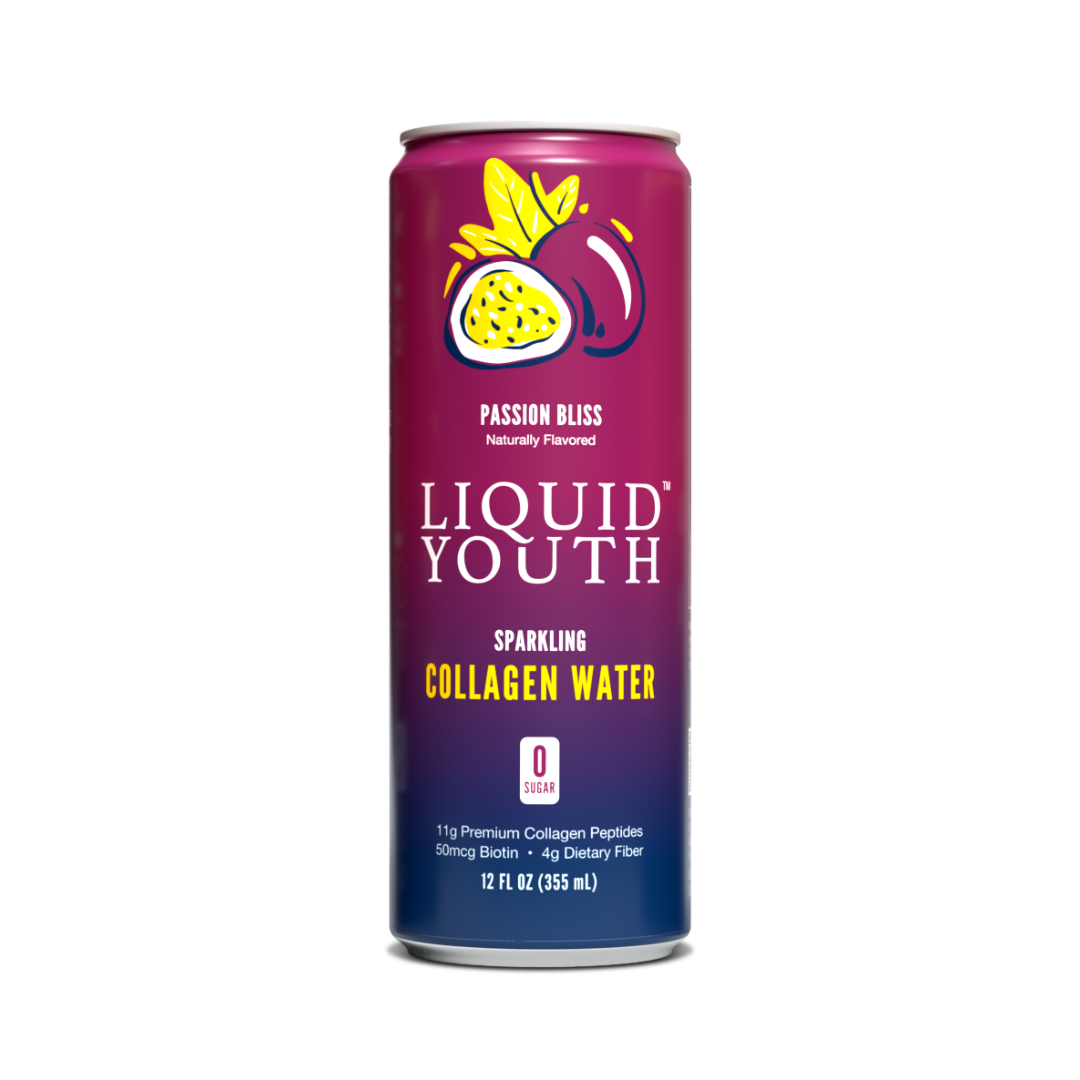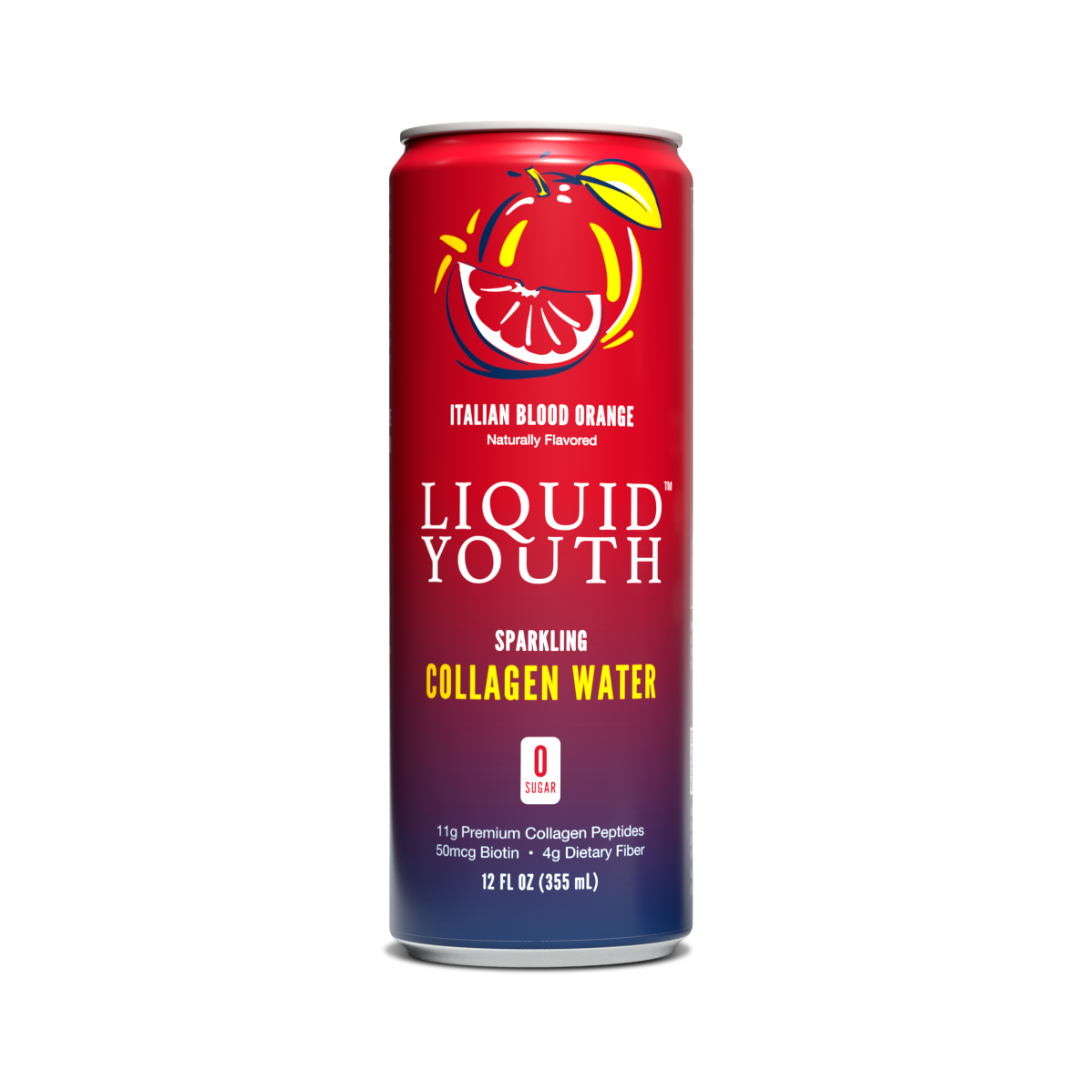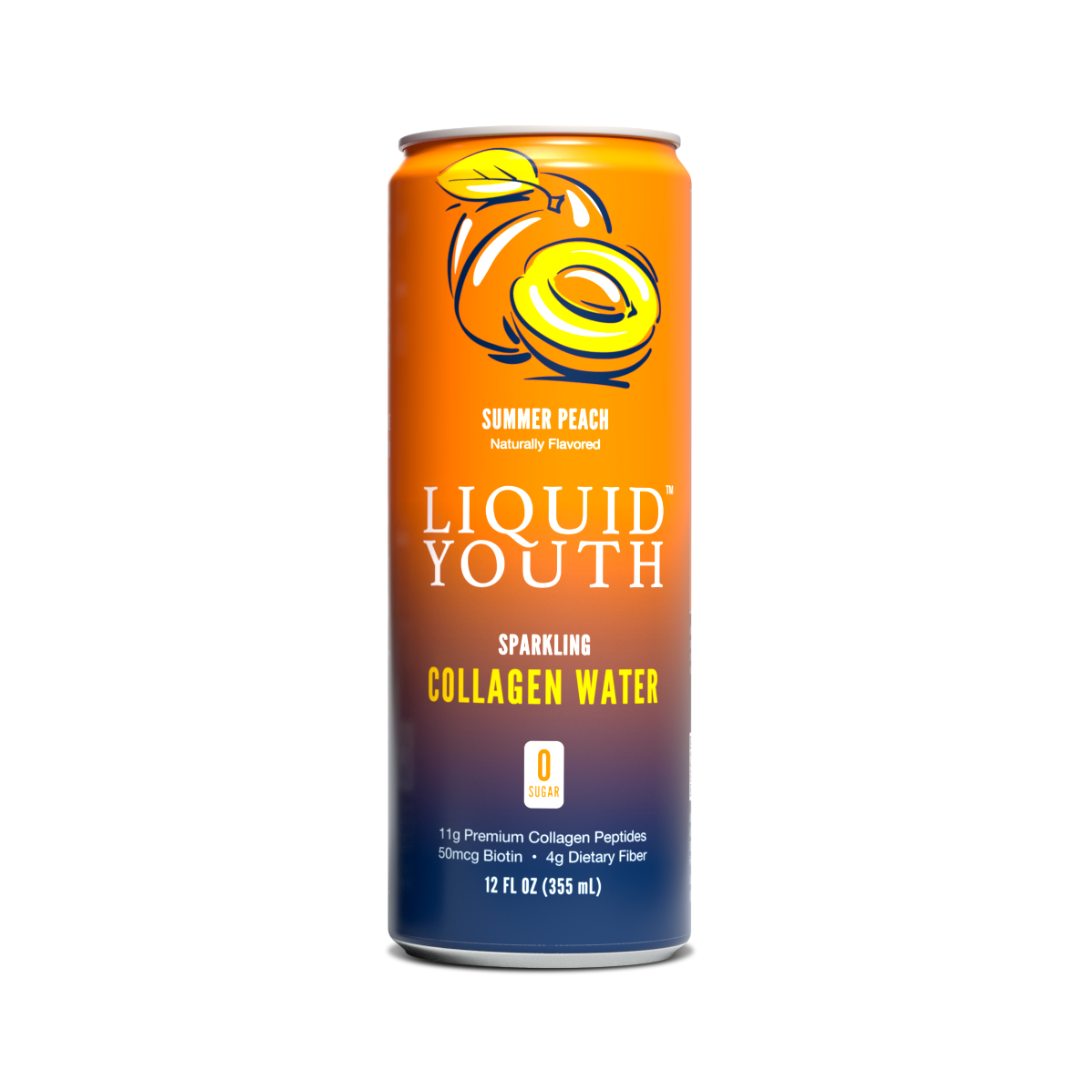Key points:
-
Pairing collagen peptides with nutrient-rich foods can support better skin health: Incorporating collagen-rich foods for skin—such as citrus fruits, leafy greens, eggs, bell peppers, and fatty fish—may enhance the absorption and effectiveness of collagen supplements by providing essential co-factors like vitamin C, biotin, and omega-3 fatty acids.
-
Products like Liquid Youth Sparkling Collagen Water provide biotin, fiber, and hydrolyzed collagen peptides, which may support skin, hair, nail, and gut health, especially when paired with whole foods that align with natural skin support.
Collagen Rich Foods for Skin: How to Naturally Boost Your Glow from Within
Let’s be honest—if you’re sipping collagen water every morning, hoping for firmer, glowing skin, you’re already ahead of the curve. But if you’re not pairing that collagen boost with the best collagen-rich foods, you might be missing out on the glow-up your skin truly deserves. Collagen production naturally slows down as we age, but a balanced diet can help. In this article, we show you the foods that help with glowing skin and how to combine them with supplements like Liquid Youth Sparkling Collagen Water for optimal results.
It’s not just about what you drink. Your glow-up journey is potentially more effective when you add a few natural ways to boost collagen—many of which are just hanging out in your kitchen right now. Let's start by exploring the best foods that support glowing skin and learn how to pair them with your collagen water (like Liquid Youth) for potentially visible results.
Why Collagen Matters for Skin Health
Let me break it down. As the most abundant protein in the skin, it constitutes about 70% of the skin’s dry weight and acts as a scaffold providing structural support to various tissues.1 Collagen is the MVP protein that can help keep our skin firm, bouncy, and smooth. But—and this is the part nobody warns you about—your collagen production starts to dip as early as your late 20s.2 That’s when you might start noticing fine lines, dull patches, and a general loss of elasticity.
Enter collagen peptides. These are hydrolyzed forms of collagen that your body may absorb more easily and may use to support healthy skin.3 Products like Liquid Youth Sparkling Collagen Water provide 11g of grass-fed collagen peptides, plus biotin and fiber, which can support your skin, gut, and hair.
Citrus Fruits: The OG Collagen Booster
Vitamin C is one of the most critical natural ways to boost collagen.4 It plays an essential role in the body’s collagen synthesis process by acting as a co-factor for enzymes that stabilize collagen. 4 Studies show that vitamin C deficiency impairs collagen formation, leading to skin fragility and poor wound healing.5
Citrus fruits—including oranges, grapefruits, lemons, and kiwis—are some of the best collagen-rich foods because of their vitamin C content and antioxidant capacity. They help protect the skin from oxidative stress and UV damage while stimulating collagen production.6
Combining citrus fruits with collagen peptides—like those in Liquid Youth—may support your skin’s structure and resilience.
-
A citrus fruit salad pairs perfectly with a Liquid Youth Sparkling Collagen Water in Summer Peach.
FUN FACT: Did you know sailors in the 18th century used citrus to prevent scurvy—a disease caused by vitamin C deficiency that leads to collagen breakdown and bleeding gums?
Leafy Greens: Skin Hydration, But Make It Edible
Leafy greens like kale, spinach, and arugula are also foods that help with glowing skin, thanks to their rich content of vitamins A, C, E, and K. These nutrients support skin cell turnover, elasticity, and hydration. 7 Chlorophyll in these greens may also contribute to detoxification and may aid in skin healing.8
-
Try a kale and citrus salad paired with Liquid Youth Italian Blood Orange Sparking Collagen Water..
FUN FACT: Oranges aren’t the only vitamin C superheroes—kiwis pack more vitamin C per gram than most citrus fruits.
Fatty Fish: Your Skin’s Lipid Bodyguard
Fatty fish like salmon and sardines provide omega-3 fatty acids, which may help support the skin barrier and reduce inflammation.9 They’re also a solid source of high-quality protein, which can complement the amino acid profile of collagen peptides.
Regularly eating fatty fish is a practical way to incorporate more foods that help with glowing skin into your routine, especially when paired with collagen peptides. The amino acid synergy can improve moisture retention and enhance your skin’s resilience.
-
Pair grilled salmon with bell peppers and lemon with Sparkling Collagen Water in Passion Bliss.
FUN FACT: Salmon’s pink color comes from astaxanthin, a carotenoid that has been shown to improve skin elasticity and reduce wrinkles!
Bell Peppers: More Vitamin C Than Oranges
Bell peppers, especially the red variety, are packed with vitamin C and antioxidants like lutein and beta-carotene that may help protect the skin against collagen degradation caused by sun exposure10.
These colorful veggies deserve a spot on the list of best collagen-rich foods not only for their vitamin content but also for their role in shielding your skin from oxidative damage. Include them raw in salads or roasted in wraps for a nutrient-dense punch.
-
Sip an Italian Blood Orange Sparkling Collagen Water with a snack of sliced red peppers and hummus.
FUN FACT: One cup of red bell peppers contain over 200% of your daily vitamin C needs!
Eggs: Biotin + Sulfur = Skin Superfood
Eggs, especially the yolk, are full of sulfur and biotin—two nutrients that can support collagen synthesis and skin barrier strength.
Including eggs in your diet gives you access to one of the most complete foods that help with glowing skin, especially when paired with collagen-boosting ingredients like avocado or whole grains.
-
Pair your avocado toast with a soft-boiled egg and a glass of Summer Peach Liquid Youth Sparkling Collagen Water.
FUN FACT: A single egg yolk contains more biotin than an entire multivitamin—just one more reason to enjoy them whole!
Let’s Talk About the Benefits of Collagen Water
If you haven’t tried collagen water yet, it might be a helpful addition to your skincare and wellness routine. The benefits of collagen water include convenient delivery of collagen peptides, hydration, fiber, and biotin—all in one fizzy can. It’s one of the easiest natural ways to boost collagen, especially when paired with collagen-rich foods for the skin.
Frequently Asked Questions (FAQ)
What are the best collagen-rich foods for skin?
Look for foods high in vitamin C, antioxidants, and protein. Citrus fruits, leafy greens, eggs, and fatty fish like salmon can support collagen production and skin health.
What are natural ways to boost collagen in the skin?
Eating collagen-rich foods, staying hydrated, sleeping well, and protecting skin from UV damage are all-natural ways to boost collagen. Collagen peptides from supplements may also be beneficial.
What are some foods that help with glowing skin?
Foods that help with glowing skin include avocados, bell peppers, cucumbers, berries, and salmon. These contain nutrients that may improve skin hydration and brightness.
What are the benefits of collagen water?
The benefits of collagen water include ease of use, hydration, and the potential to support skin, hair, nails, joints, and gut health—especially when paired with a healthy diet.
References
1 M, D. S. A. S. & Sn, N. R. K. K. Role of Diet in Dermatological Conditions. Journal of Nutrition & Food Sciences 05 (2015). https://doi.org/10.4172/2155-9600.1000400
2 Khalid, A., Iqbal, Z., Rehman, S.-U. & Yousaf, Z. Role of Vitamin C in Skin Aging Mechanism-a Narrative Review. 4, 1489-1494 (2024). https://doi.org/10.61919/jhrr.v4i2.1078
3 Proksch, E. et al. Oral Supplementation of Specific Collagen Peptides Has Beneficial Effects on Human Skin Physiology: A Double-Blind, Placebo-Controlled Study. Skin Pharmacology and Physiology 27, 47-55 (2013). https://doi.org/10.1159/000351376
4 Pullar, J. M., Carr, A. C. & Vissers, M. C. M. The Roles of Vitamin C in Skin Health. Nutrients 9, 866 (2017).
5 Pullar, J. M., Carr, A. C. & Vissers, M. C. M. The Roles of Vitamin C in Skin Health. Nutrients 9 (2017). https://doi.org/10.3390/nu9080866
6 Podgórska, A., Kicman, A., Naliwajko, S. K., Wacewicz-Muczyńska, M. & Niczyporuk, M. Effect of Intake of Selected Nutrients on Skin Firmness and Elasticity in Women. Frontiers in Nutrition 11 (2024). https://doi.org/10.3389/fnut.2024.1483678
7 De, L. & De, T. HEALTHY FOOD FOR HEALTHY LIFE. Journal of Global Biosciences 8, 6453-6468 (2019).
8 Martins, T., Barros, A. N., Rosa, E. & Antunes, L. Enhancing Health Benefits through Chlorophylls and Chlorophyll-Rich Agro-Food: A Comprehensive Review. Molecules 28 (2023). https://doi.org/10.3390/molecules28145344
9 Calder, P. C. n−3 Polyunsaturated fatty acids, inflammation, and inflammatory diseases 2. The American Journal of Clinical Nutrition 83, 1505S-1519S (2006). https://doi.org/https://doi.org/10.1093/ajcn/83.6.1505S
10 Crișan, D., Roman, I., Scharffetter‐Kochanek, K., Crişan, M. & Badea, R. The Role of Vitamin C in Pushing Back the Boundaries of Skin Aging: An Ultrasonographic Approach. Clinical Cosmetic and Investigational Dermatology, 463 (2015). https://doi.org/10.2147/ccid.s84903

